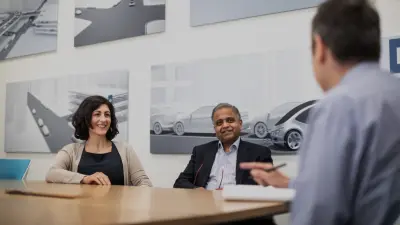A Small Window into a Large World
In the third interview, Bosch executives Arun Srinivasan and Maurizia Bagnato discuss the differing expectations millennials have in the modern-day work place, and the cultural shift traditional business are embarking on to attract, retain and grow them.

Tech-savvy millennials have a different attitude to working than previous generations. With that in mind, what more can Bosch do to attract young people into the organisation?
AS: Technology is changing at such a pace that digitalisation is bound to bring more young people into the mobility space. The automobile is being re-engineered more than 100 years after it was first invented. The digital world is making things happen differently, so you need different sets of skills. The challenge is to attract, retain and grow individuals and teams.
I’ve worked for Bosch all my life. The next generation is probably not going to do that. That’s the challenge.
We have to engage with millennials and take on board their viewpoints. That’s very important.
They are less concerned about hierarchies and management structures. I’ve watched my daughter and son grow up – it’s been an inspiration to see the way they think and how their views develop. The sense of doing things differently is very much a part of that generation.
We now have leaner, more agile businesses. We have acquired small, disruptive start-ups who are challenging conventional thinking and norms. There is a fresher, more modern feel within the organisation as a whole. Bosch will always be recognised as a leader in innovation and that helps attract young talent. We have to continue to encourage the right culture.
Do you think there’s a bit of disconnect here? Bosch is viewed by many as a ‘traditional’ company, known for manufactured products. Millennials, meanwhile, have grown up with software-enabled companies. Is that going to make it difficult for Bosch to attract these people?
AS: Bosch, as a company, has been on a transformation journey to an IoT company for some time and has changed significantly. We can’t stand still – we need to change. There is a cultural shift taking place. You can see it happening.

MB: I agree. Changes are being made throughout the company. Starting from promoting a different leadership style where leaders support people, make things simple, enable fast decisions and focus on innovation in agile teams that transcend hierarchies.
Moreover, many offices have been redesigned and are now better structured for flexible and collaborative working. Other change examples include new learning platforms that Bosch is developing in order for associates to benefit from the ‘know-how’ accessible to the company, both internally and from outside sources. This approach really suits a more modern learning style. That is part of the journey we are on.
What impact do young people have on the organisation?
AS: Students make up a good part of our workforce. They are in research and development, engineering, project management, logistics – everywhere across the business.
We like the can-do attitude that students often have – they help rejuvenate our teams.
We run graduate specialist programmes where associates change roles every six months, so you also have a new group of people coming in to your team which makes for a continuous breeze of fresh air into the organisation and that’s a positive thing.
We are a truly global company and associates are encouraged to move around, to make the most of the international opportunities available to them – when you enter for the first time Bosch can offer a small window into a large world.
It’s clear that Bosch values diversity. Why is it so important to have people from different backgrounds?
MB: I came into the UK after Arun offered me a job here. From the first moment I was impressed by the diversity of the teams and I could appreciate the richness of having groups made up of people from different backgrounds, culture and attitudes.
AS: For me it is really about having diversity of thought. I have seen many times the difficulty you can face progressing projects when everyone thinks the same. The only way to break the deadlock, to move things forward, is to look at situations from a different angle.

In my own free time I sketch – and I am very self-critical of my output. I walk away. Come back, look at it from a different angle. It is that freshness of mind that can really help when applied in a business environment. For example, I had a previous automotive customer who faced a very serious problem that was threatening to stop an engine programme. And it was a Spanish female engineer at Bosch– working with colleagues from Britain and Germany – who provided the solution by viewing things from a different angle.
That change of perspective is important. And you can only get that when you have a team with different cultures, genders and diverse age groups.
How can Bosch continue to invest in the talents of the future?
MB: We are a privately owned company with 92% of the shares owned by a charitable foundation. As per our motto - ‘invented for life’ - there is a strong sense of wanting to give back to society and we need to continue to join hands with other like-minded organisations to spark the enthusiasm in the next generation of engineers.

